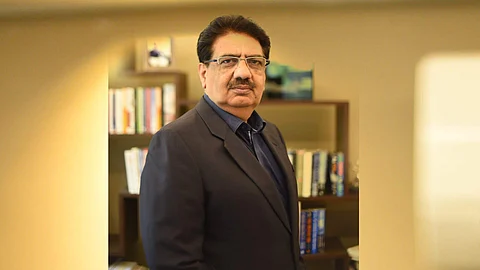Education has to be freed from the clutches of self-interest groups: Vineet Nayar
When you're at the top of the corporate food chain, there is a high likelihood that you'll be invested in academia. Almost like a natural progression of sorts. Vineet Nayar, former CEO of HCL Technologies and currently the Founder-Chairperson of the Sampark Foundation is one of those people who has kept that spark well and truly alive. In a free-ranging conversation about the state of education in India, the need for primary school transformation across the country and what the government can do to turn things around, we cover a lot of ground. Excerpts:
The current education system in India has been criticised for being inefficient and outdated. What are the challenges you think that are most pertinent and how should the government deal with them?
There are numerous challenges in the Indian educational system at the bottom of the pyramid-like inadequately qualified and uninterested teachers, high absenteeism, flawed pedagogy, multi-grade classrooms and poor infrastructure. The learning outcomes continue to be alarmingly poor despite many attempts by government and non-government actors over the last 5 decades. Given its size and diversity, education in India needs a layered, localised approach. Both governmental as well as non-governmental interventions need to take a constructive, and not destructive, approach towards making sure the system delivers quality education to our children. This means everyone needs to focus on filling the gaps, and not reinventing the system as a whole
How do you think quality education can be made more accessible to students residing in remote areas?
The change will not be easy. I believe that such large scale change is only possible through disruptive, frugal and innovative ideas that leverage what we have rather than wish we had more, ideas that are easy and practical to execute, ideas that ignite the classroom and deliver better outcomes despite the challenges. We need to learn from states like Chhattisgarh where 32,000 schools have shown significant increase in learning outcomes because of innovation in classroom transactions using the audio box to teach English, offline apps with animated videos to build teacher capacity even in the absence of internet connectivity, innovative TLMs to teach math from concrete to abstract and finally a monitoring system that tracks learning outcomes of 3.2 million children every month. There are ideas that have demonstrated impact at scale and these are cost-effective. We now need to adopt them as national ideas and they will act as a catalyst of change and the rest will be magic.
Do you think that teachers need motivation? What would work best?
I have watched many CEOs make the mistake of assuming that employees are part of their problem rather than an opportunity to solve one. These companies die a slow death. Our education thinkers and administrators have been making the same mistake over the last five decades thus the problem has remained unresolved. Try and get into the shoe of a rural teacher dealing with a multi-grade classroom where children's attendance and a parent's motivation is a challenge. You would realise that this teacher needs to be enabled and not blamed for the state of education in our country. I firmly believe that any transformation in learning outcomes will come from innovation in classroom transaction executed by the teacher on the ground. It will not come from attendance systems, monitoring systems, threats or pressure. We need to find ways of inspiring the teachers we have, enabling them with frugal resources to overcome their limitations and encourage them to create magic in the classrooms. Change is addictive if you start seeing it work. I believe we can make this change a positive experience for teachers and they will bring about the transformation which we have been waiting for.
Is the plan to have more autonomous institutes as mentioned in the NEP 2019 a good move?
Yes, it’s a great move if it sees the light of the day as proposed. Education has to be freed from the clutches of self-interest groups and it will grow the way banking has grown. It is important to understand that education builds the country’s competitive advantage and it cannot be a hostage to a few dark rooms. It needs to be open, transparent and proactive in building a new India through the minds of some very bright Indians
Click here to read more latest education news.


